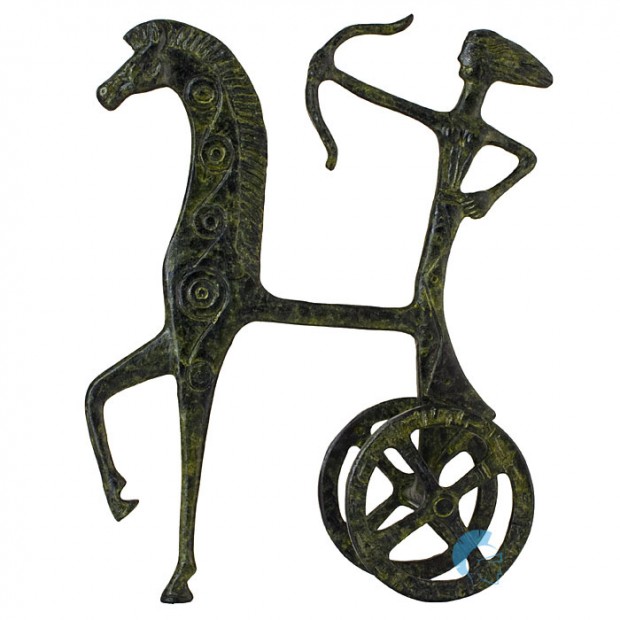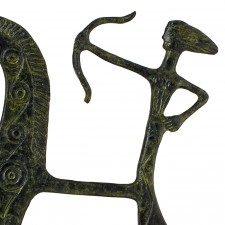Άρμα της Θεάς Άρτεμης
Ορειχάλκινο άρμα της θεάς Άρτεμης.
Χειροποίητο ορειχάλκινο γλυπτό, με εγγύηση ποιότητας. Παραδοσιακά φτιαγμένο με τη μέθοδο χύτευσης μετάλλου και με οξείδωση παρόμοια με του μουσείου.
H Άρτεμη (λατινικά Diana) είναι μια από τις παλαιότερες, πιο περίπλοκες αλλά και πιο ενδιαφέρουσες μορφές του ελληνικού πανθέου. Κόρη του Δία και της Λητούς, δίδυμη αδερφή του Απόλλωνα, βασίλισσα των βουνών και των δασών, θεά του κυνηγιού, προστάτιδα των μικρών παιδιών και ζώων.
Η Εστία, η Αθηνά και η Άρτεμη, ήταν οι μόνες Θεές που πάνω τους δεν είχε δύναμη η Αφροδίτη (που είχε υποτάξει το σύνολο Θεών και ανθρώπων).
Αντίστοιχη της Άρτεμης στη ρωμαϊκή μυθολογία είναι η Ντιάνα, ενώ στην ετρουσκική μυθολογία η θεότητα Αρτούμες. Η γέννηση της ιδιόρρυθμης θεάς τοποθετείται στο νησί Ορτυγία. Σ' αυτό το άγονο πετρονήσι και μετά από φοβερές ταλαιπωρίες και περιπλανήσεις είχε καταφύγει η έγκυος Λητώ προκειμένου να κρυφτεί και να προφυλαχτεί από την καταδιωκτική μανία της νόμιμης συζύγου του Δία, της Ήρας. Εκεί και με τη βοήθεια όλων των γυναικείων θεοτήτων (εκτός της Ήρας) ήρθε στο φως η Άρτεμις και λίγο αργότερα ο αδελφός της Απόλλωνας.
Από τις πρώτες κιόλας ώρες της γέννησής της η Άρτεμη παίρνει πρωτοβουλίες. Αν και νεογέννητο βρέφος, βοηθά την εξουθενωμένη μητέρα της να ξεγεννήσει και το δεύτερο της παιδί, τον Απόλλωνα, και ταυτίζεται με τον τρόπο αυτόν με την Ειλείθυια, από το ελεύθω+υιός, δηλαδή μαμμή, και άρα τη θεά του τοκετού. Πανέμορφη και πανέξυπνη η Άρτεμη, είχε από πολύ νωρίς κερδίσει την εκτίμηση των άλλων θεών. Ήδη από τα τρία της χρόνια είχε συγκεκριμένες απαιτήσεις, που αφορούσαν την ενδυμασία της, τον εξοπλισμό της και την ακολουθία της στην πιο αγαπημένη της ενασχόληση, το κυνήγι. Ήταν παιδί που ήξερε τι ήθελε και πραγματικά σταθερό και άκαμπτο στις αποφάσεις του.
Ο Δίας τη θαύμαζε για την επιμονή της και, λόγω της ευστροφίας της, της έτρεφε πολύ μεγάλη αγάπη και ικανοποιούσε όλες της τις επιθυμίες. Ένα από τα πρώτα πράγματα που ζήτησε η Άρτεμη σαν δώρο από τον πατέρα της ήταν η αιώνια αγνότητα και παρθενία. Πιστή και σταθερή σ' ό,τι ζητούσε και τη δέσμευε, η παρθενική θεά δε σπίλωσε ποτέ ούτε το ήθος της ούτε και τον χαρακτήρα της. Σοβαρή και περήφανη, διατήρησε την αγνότητά της περιφρονώντας ερωτικές πολιορκίες και επιθέσεις. Αφοσιωμένη στο κυνήγι και τη φύση, αδιαφόρησε για τις χαρές του γάμου και τις απολαύσεις του έρωτα. Με επιβολή και αυστηρότητα απαίτησε την αθωότητα και την παρθενικότητα όχι μόνο του εαυτού της, αλλά και των Νυμφών που την περιστοίχιζαν και επίσης αυτών που με τις υπηρεσίες τους την τιμούσαν.
Η Άρτεμη ήταν θεά αμείλικτη που ποτέ σχεδόν δε συγχωρούσε. Οποιαδήποτε παρατυπία σε βάρος της, οποιαδήποτε παρέκκλιση από τα πιστεύω της και τις αρχές της, άξιζε την τιμωρία της. Η αδυσώπητη οργή της ήταν έτοιμη να ξεσπάσει ανά πάσα στιγμή απέναντι στον παραβάτη των αυστηρών της κανόνων. Τα θανατηφόρα της βέλη στόχευαν διαρκώς θνητούς, θεούς και ήρωες που παρέβλεπαν την ύπαρξή της ή αμελούσαν τις αρχές και τη λατρεία της. Κάποτε ο Ακταίωνας, ο γιος της Αυτονόης και του Αρισταίου, έτυχε να δει την Άρτεμη γυμνή, την ώρα που έκανε το λουτρό της. Η θεά, από φόβο μήπως διαδοθεί το περιστατικό, τον μεταμόρφωσε σε ελάφι κι έβαλε τα πενήντα σκυλιά που τον συνόδευαν να τον κατασπαράξουν. Σε μια άλλη περίπτωση η Καλλιστώ, η κόρη του Λυκάονα (και μια από τις συνοδούς της Άρτεμης στο κυνήγι) κόντεψε να χάσει τη ζωή της από τα βέλη της θεάς γιατί, αποπλανημένη από τον Δία, είχε χάσει την αγνότητά της και είχε μείνει έγκυος. Επίσης η Άρτεμη σκότωσε και την Αριάδνη, γιατί σύμφωνα με τον μύθο είχε απαχθεί και αποπλανηθεί από τον Θησέα στη Νάξο. Τέλος ο Ωρίων, ο γιος του Ποσειδώνα, βρήκε κι αυτός τραγικό θάνατο από τα βέλη της Άρτεμης, γιατί σύμφωνα με μια παράδοση είχε σμίξει με τη θεά της αυγής Ηώ, ή γιατί σύμφωνα με κάποια άλλη παράδοση είχε καυχηθεί ότι ήταν καλύτερος απ' αυτήν στην τέχνη του τόξου. Η Άρτεμη είχε ιδιαίτερη αδυναμία στα παιδιά και τους έφηβους. Νέοι και νέες που διατηρούσαν την αθωότητά τους και που ζούσαν σύμφωνα με τις αρχές της ήταν πάντοτε ευνοούμενοί της και βρίσκονταν διαρκώς κάτω από την προστασία της. Ο Ιππόλυτος, μάλιστα, που ήταν αφοσιωμένος σ' αυτήν και τη λατρεία της, αποτελεί ζωντανό παράδειγμα αυτής της τακτικής και αδυναμίας της θεάς.
Ο Ιππόλυτος, λοιπόν, δεινός κυνηγός και αλογοδαμαστής, είχε αφιερώσει τη ζωή του στην πανέμορφη Άρτεμη και στο ιδανικό που η ίδια πρέσβευε. Καμιά πρόκληση, καμιά γυναίκα δε στάθηκε ποτέ ικανή να τον παρασύρει. Ούτε και η Φαίδρα, η γυναίκα του Θησέα, μπόρεσε με τη γοητεία της να τον αποπλανήσει. Η υποδειγματική του συμπεριφορά έκανε τη θεά να συγκινηθεί και να του χαρίσει τιμές, δόξες και αιώνια -μετά το θάνατό του- μνήμη του ονόματός του. Η Άρτεμη ήταν μια από τις ομορφότερες και κομψότερες θεές του Ολύμπου. Οι αρχαίοι Έλληνες πραγματικά τη θαύμαζαν. Τη φαντάζονταν ψηλή, με ευγενική ομορφιά, αγέρωχη κορμοστασιά και περήφανο περπάτημα.
Γενικά, η Άρτεμη ήταν θεά δραστήρια, σκληρή και αεικίνητη. Στις περισσότερες εκδηλώσεις της εμφανίζεται συνειδητοποιημένη, ώριμη κι αποφασιστική, ενώ λίγα ήταν τα περιστατικά εκείνα στα οποία παρουσίαζε μια εικόνα τελείως διαφορετική.
Κατά τη θεομαχία, η περήφανη και απαιτητική κόρη του Δία εμφανίζεται σαν ένα μικρό ανώριμο κορίτσι που οφείλει να υπακούει, να σέβεται και να συμμορφώνεται στις επιταγές της γυναίκας του πατέρα της και του αδελφού της. Απέναντι στη διστακτικότητα του Απόλλωνα να μονομαχήσει με τον Ποσειδώνα, η Άρτεμη κρατά στάση αρνητική και αντιμετωπίζει τον δίδυμο αδελφό της με λόγια ειρωνικά, αναιδή και περιφρονητικά. Η Ήρα, παρούσα στο περιστατικό, εξοργίζεται με τη συμπεριφορά της και με μανία αρχίζει να τη χτυπά με τα ίδια της τα βέλη.
Μια από τις πιο αγαπημένες ενασχολήσεις της Άρτεμης ήταν το κυνήγι. Γυναίκα δραστήρια, ορμητική και ευκίνητη, η ελεύθερη και αεικίνητη θεά διοχέτευε το μεγαλύτερο μέρος της ενεργητικότητάς της στην αναζήτηση και καταδίωξη θηραμάτων στα βουνά. Συνοδευόμενη από δροσερές και όμορφες νύμφες και περιστοιχισμένη από άγρια κυνηγόσκυλα, με ακόλουθο τον σκορπιό, έτρεχε γύρω από λίμνες, ποτάμια, λιβάδια και βουνά προκειμένου να απαντηθεί με άγρια κυρίως ζώα. Ντυμένη με λιτό ελαφρύ ρούχο και εφοδιασμένη με τον κατάλληλο για την περίσταση εξοπλισμό ριχνόταν με ενθουσιασμό και μανία σ' αυτό που κυρίως την ενδιέφερε. Αδάμαστη, σκληρή κι αγέρωχη, δεινή γνώστρια της τοξευτικής τέχνης και πολύ ικανή δρομέας και κυνηγός, επιδιδόταν με πάθος στο κυνήγι.
Ένα από τα βασικότερα γνωρίσματα της Άρτεμης ήταν η καθολική της κυριαρχία στη φύση. Ήμερα και άγρια ζώα, ψάρια στα νερά και πουλιά στον αέρα ήταν όλα τους κάτω από την προστασία της.
Ως θεά και προστάτιδα της φύσης η Άρτεμη θεωρείτο υπεύθυνη τόσο για τη γεωργία όσο και για την κτηνοτροφία. Περιοχές που τη λάτρευαν και την τιμούσαν ανελλιπώς είχαν πάντα εύφορη γη, κατάσπαρτα χωράφια, πλούσια συγκομιδή και ζώα υγιή και γόνιμα. Αντίθετα, όσες από τις περιοχές δεν τηρούσαν σωστά τις υποχρεώσεις τους απέναντί της και επιπλέον παρέβλεπαν την ύπαρξή της, είχαν να αντιμετωπίσουν την εκδικητική οργή και μανία της, που ισοδυναμούσε με καταστροφή των σπαρτών και αποδεκατισμό των κοπαδιών.
Ο Άδμητος και ο Οινέας αντιμετώπισαν, εξαιτίας της αμέλειας και της αδιαφορίας που έδειξαν, την οργή της θεάς. Ο Άδμητος στη γαμήλια γιορτή του είχε ξεχάσει να θυσιάσει (όπως επιβαλλόταν) στην Άρτεμη. Η Άρτεμη οργισμένη από αυτή την παρατυπία του έστειλε στο νυφικό του κρεβάτι ένα κοπάδι από φίδια, ενώ ετοιμάστηκε να του αφαιρέσει τη ζωή. Μάταια ο Απόλλωνας προσπάθησε να την καλοπιάσει. Τελικά ο ίδιος πείθει τις Μοίρες να του χαρίσουν τη ζωή και σαν αντάλλαγμα να πάρουν τη ζωή κάποιου άλλου δικού του ανθρώπου. Στην απαίτηση αυτή των Μοιρών μόνο η γυναίκα του Άλκηστις προθυμοποιείται να προσφερθεί. Τελευταία όμως στιγμή η επέμβαση του Ηρακλή τη σώζει προτού ακόμη προλάβει η ψυχή της να κατέβει στον Άδη.
Ο Οινέας κάποτε είχε ξεχάσει να θυσιάσει στην προστάτιδα της πόλης του Καλυδώνας, δηλαδή στην Άρτεμη. Η αδιαφορία του αυτή κόστισε τόσο στην πόλη, όσο και στο λαό της. Ένας τεράστιος κάπρος σταλμένος από τη θεά προκάλεσε τεράστιες καταστροφές σε γη, σε ζώα και ανθρώπους. Κανείς δε τολμούσε να τον σκοτώσει. Ο Μελέαγρος μόνο, ο γιος του Οινέα, ήταν τελικά εκείνος που τον εξόντωσε, αλλά στη συνέχεια σκοτώθηκε σε μια συμπλοκή γύρω από τη μοιρασιά. Η γυναίκα και η μητέρα του Μελέαγρου μη αντέχοντας τη θλίψη του θανάτου του αυτοκτόνησαν από τη στεναχώρια τους. Οι αδερφές του, τέλος, που αδιάκοπα τον θρηνούσαν, μεταμορφώθηκαν από την Άρτεμη σε φραγκόκοτες. Πέρα από τη συμμετοχή της σ' όλα τα παραπάνω περιστατικά, η θεά του κυνηγιού παίρνει ενεργό μέρος και σ' έναν από τους δώδεκα άθλους του Ηρακλή. Ο Ηρακλής για μεγάλο διάστημα καταδίωκε μια πανέμορφη ελαφίνα με χρυσά κέρατα και χάλκινα πόδια, ιδιοκτησία της θεάς Άρτεμης. Η Άρτεμη, με τη συνδρομή του αδερφού της, του Απόλλωνα, τον εμποδίζει να σκοτώσει το άγριο ζώο και τον προτρέπει να το παραδώσει στην Τίρυνθα, στο βασιλιά Ευρυσθέα. Με την παραλαβή του ζώου ο Ευρυσθέας αναλαμβάνει να της το ξαναφιερώσει. Όπως στο μύθο με τον Ηρακλή, έτσι και σε πολλά άλλα περιστατικά η Άρτεμη συμπράττει με τον αδερφό της τον Απόλλωνα για την επίτευξη κάποιου σκοπού.Στην περίπτωση της Νιόβης που παινεύτηκε (συγκριτικά με τη Λητώ) για τα πολλά και όμορφα παιδιά της έχουμε τη συνεργασία των δυο δίδυμων αδερφών στην τιμωρία της. Επτά βέλη της Άρτεμης κι επτά του Απόλλωνα καρφώθηκαν στα δεκατέσσερα παιδιά της και τα σκότωσαν. Με τον ίδιο ακριβώς τρόπο και για τον ίδιο λόγο η Άρτεμη σκότωσε κάποτε τη Χιόνη (την κόρη του Δαιδαλίωνα και ερωμένη του Απόλλωνα), γιατί είχε καυχηθεί ότι η ομορφιά της ήταν τέτοια που ξεπερνούσε ακόμα κι αυτήν της πανέμορφης θεάς.
Ο πόλεμος μεταξύ Ελλήνων και Τρώων δεν βρίσκει την Άρτεμη αδιάφορη. Μαζί με τον αδελφό της τον Απόλλωνα, τον Άρη, την Αφροδίτη και τη Λητώ συμμετέχει ενεργά με το μέρος των Τρώων. Ένα από τα πρώτα περιστατικά που συνέβησαν προτού ακόμη ξεκινήσει ο πόλεμος οφειλόταν στο θυμό και την οργή της Άρτεμης. Ο ελληνικός στόλος, εξαιτίας της άπνοιας που είχε δημιουργήσει η θεά, δεν μπορούσε να ξεκινήσει. Ένα τυχαίο περιστατικό του αρχηγού των Αχαιών Αγαμέμνονα είχε προκαλέσει την κατάσταση αυτή. Κάποτε χωρίς ο ίδιος να το αντιληφθεί είχε εισβάλει σ' ένα άλσος αφιερωμένο στην Άρτεμη και είχε σκοτώσει ένα ιερό ελάφι. Η θεά εξοργίστηκε τόσο πολύ που απαίτησε τη θυσία της κόρης του Ιφιγένειας προκειμένου ευνοϊκοί άνεμοι να βοηθήσουν το σαλπάρισμα των ελληνικών καραβιών.
Ο πληγωμένος από τον Διομήδη, τέλος, Αινείας είχε στη διάρκεια του πολέμου δεχτεί τη βοήθεια της Άρτεμης και της Λητούς και είχε κατορθώσει χάρη σ' αυτές να ανακτήσει τις δυνάμεις του και να επιστρέψει στη μάχη.
Τα σύμβολα της Άρτεμης ήταν πολλά και ποικίλα. Ξεκινούσαν από ζώα και φυτά και κατέληγαν σε όπλα: κατσίκα, τράγος, ελάφι, αρκούδα, σκύλος, φίδι, δάφνη, φοίνικας, κυπαρίσσι, σπαθί, φαρέτρα, ακόντιο και άλλα.
Διαβάστε περισσότερα εδώ
| Λεπτομέρειες | |
| Ύψος | 18cm |
| Βάρος | 400g |
| Υλικό | Ορειχάλκινο |



